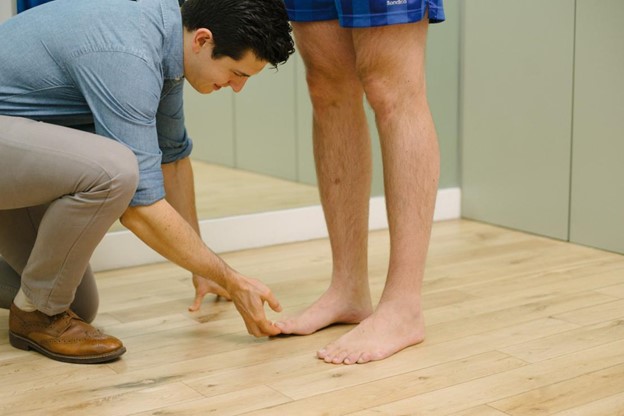Why You Shouldn’t Ignore Foot Pain: Insights from a Leading Singaporean Podiatrist
Foot Pain: When to Seek Help and Why It Matters

Foot pain is a common ailment that affects people of all ages and walks of life. From the occasional discomfort after a long day to chronic pain that persists and worsens over time, foot pain is often overlooked or dismissed as a minor inconvenience.
However, neglecting foot pain can lead to more severe health problems, impacting your mobility, overall health, and quality of life. In this article, we delve into why you shouldn’t ignore foot pain, with expert insights from a leading Singaporean podiatrist.
The Importance of Healthy Feet
Your feet are the foundation of your body, bearing the weight of your entire frame and allowing you to perform daily activities such as walking, running, and standing. Despite their importance, feet are often one of the most neglected parts of the body.
Foot pain is frequently attributed to temporary factors such as wearing uncomfortable shoes, standing for too long, or overexerting oneself. While these can indeed cause temporary discomfort, persistent foot pain may indicate underlying health issues that require professional attention.
Healthy feet are crucial for maintaining good posture, balance, and mobility. Any disruption in foot health can lead to compensatory movements, putting undue stress on other parts of the body such as the knees, hips, and lower back. This can result in a cascade of musculoskeletal problems that could have been prevented by addressing the initial foot pain.
Common Causes of Foot Pain

Foot pain can be caused by a variety of factors, ranging from minor injuries to chronic conditions. Understanding the root cause of your foot pain is essential in determining the appropriate treatment. Here are some common causes:
- Plantar Fasciitis: One of the most common causes of heel pain, plantar fasciitis occurs when the ligament that supports the arch of your foot becomes inflamed. This condition is often caused by overuse, wearing shoes with inadequate support, or having flat feet.
- Bunions: Bunions are bony protrusions that appear at the base of the big toe and can lead to considerable discomfort and pain, particularly when wearing narrow or tight shoes. While often hereditary, bunions can also result from inappropriate footwear or abnormal foot mechanics.
- Arthritis: Arthritis, particularly osteoarthritis and rheumatoid arthritis, can cause pain and stiffness in the joints of the feet. This condition is more common in older adults and can lead to significant mobility issues if left untreated.
- Neuropathy: Nerve damage, often associated with diabetes, can lead to neuropathy, causing pain, tingling, or numbness in the feet. Diabetic neuropathy is a serious condition that can result in ulcers or infections if not properly managed.
- Stress Fractures: Repetitive stress on the feet, often from high-impact activities like running, can cause tiny cracks in the bones known as stress fractures. These fractures can cause significant pain and require rest and proper treatment to heal.
- Flat Feet: Flat feet, sometimes referred to as fallen arches, happen when the foot’s arch flattens out, resulting in the foot rolling inward more than usual, a motion known as overpronation. This condition can lead to pain and discomfort in the feet, ankles, and lower legs. It can also be associated with other issues, such as knee pain or shin splints, due to improper alignment and added stress on the legs.
- Morton’s Neuroma: This condition involves the thickening of tissue around the nerves leading to the toes, which often results in sharp, burning pain in the ball of the foot. Morton’s Neuroma is frequently linked to wearing high heels or tight shoes that compress the toes.
The Risks of Ignoring Foot Pain
Ignoring foot pain can have far-reaching consequences that extend beyond the feet themselves. Here’s why it’s crucial to address foot pain promptly:
- Progression of Underlying Conditions: Many foot conditions, such as plantar fasciitis or arthritis, can worsen over time if left untreated. What starts as mild discomfort can progress into chronic pain, making it increasingly difficult to manage and treat.
- Impact on Mobility: Foot pain can significantly affect your ability to walk, run, or even stand for prolonged periods. This can lead to a sedentary lifestyle, increasing the risk of weight gain, cardiovascular disease, and other health issues associated with inactivity.
- Secondary Injuries: When experiencing foot pain, it’s common for individuals to alter their gait or posture to reduce discomfort. This compensatory behaviour can lead to additional strain on other parts of the body, such as the knees, hips, or back, resulting in secondary injuries.
- Development of Chronic Pain: Ignoring acute foot pain can lead to the development of chronic pain, which is much more challenging to treat. Chronic pain can severely impact your quality of life, leading to difficulties in performing daily activities and affecting your mental well-being.
Increased Risk of Complications: For individuals with diabetes or circulatory problems, ignoring foot pain can lead to more severe complications, such as ulcers, infections, or even the risk of amputation. Proper foot care is essential for preventing these complications.
When to See a Podiatrist

If you’re experiencing persistent foot pain that doesn’t improve with rest or over-the-counter treatments, it’s essential to consult a podiatrist. A podiatrist is a specialist in foot and ankle health, trained to diagnose and treat a wide range of foot conditions.
Some signs that indicate it’s time to see a podiatrist include:
- Persistent Pain: If your foot pain lasts for more than a week, or if it worsens over time, it’s important to seek professional advice.
- Swelling and Redness: Swelling, redness, or warmth around the foot can indicate an infection or inflammation that requires medical attention.
- Difficulty Walking: If foot pain is affecting your ability to walk or perform daily activities, it’s crucial to see a podiatrist to prevent further complications.
- Numbness or Tingling: These symptoms may indicate nerve damage, which needs to be evaluated by a healthcare professional.
- Visible Deformities: Bunions, hammertoes, or other visible deformities should be assessed by a podiatrist to determine the best course of treatment.
Treatment Options
The treatment for foot pain varies depending on the underlying cause. A podiatrist will conduct a thorough examination, which may include imaging studies such as X-rays or MRIs, to diagnose the condition accurately. Here are some common treatment options:
- Orthotic Devices: Custom orthotic devices can help alleviate foot pain by providing support and correcting abnormal foot mechanics. These devices are often used to treat conditions like plantar fasciitis, flat feet, and bunions.
- Physical Therapy: Physical therapy can be beneficial in strengthening the muscles around the feet and improving flexibility. It is often recommended for conditions such as plantar fasciitis, arthritis, and after foot surgery.
- Medication for Foot Pain: Over-the-counter medications like ibuprofen or acetaminophen can help alleviate mild foot pain. In cases of more severe pain, a podiatrist may suggest stronger prescription medications or administer corticosteroid injections.
- Surgery: In some cases, surgery may be necessary to correct structural problems or remove damaged tissue. Surgical options are typically considered when conservative treatments have failed to provide relief.
- Lifestyle Modifications: Making changes to your footwear, activity levels, and overall lifestyle can have a significant impact on foot health. A podiatrist can guide on choosing the right shoes, modifying your activities, and incorporating foot-strengthening exercises into your routine.
Preventive Measures for Healthy Feet

Taking care of your feet is essential for preventing foot pain and maintaining overall health. Here are some preventive measures to keep your feet in top condition:
- Wear Proper Footwear: Choose shoes that fit well and provide adequate support for your feet. Avoid high heels, tight shoes, and footwear that lacks arch support.
- Maintain a Healthy Weight: Excess weight puts additional pressure on your feet, increasing the risk of conditions such as plantar fasciitis and arthritis.
- Practice Good Foot Hygiene: Keep your feet clean and dry to prevent infections. Trim your toenails regularly and avoid walking barefoot in public areas.
- Stretch and Strengthen: Incorporate foot stretches and strengthening exercises into your routine to improve flexibility and reduce the risk of injury.
- Listen to Your Body: Pay attention to any signs of foot pain or discomfort, and address them promptly. Don’t push through the pain, as this can lead to more serious problems.
Conclusion
Foot pain is not something to be taken lightly. While it may seem like a minor issue, ignoring foot pain can lead to significant health problems that affect your mobility and overall well-being.
By understanding the causes of foot pain and seeking prompt treatment from a podiatrist, you can prevent complications and maintain healthy, pain-free feet. Don’t wait until the pain becomes unbearable—take action today to protect your foot health and ensure a better quality of life.








